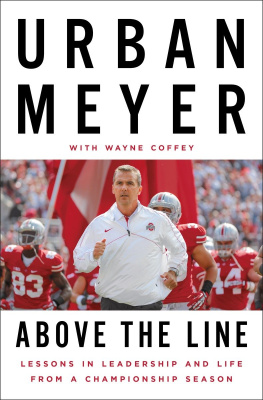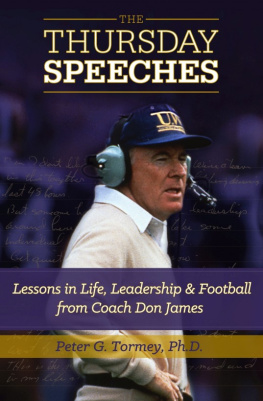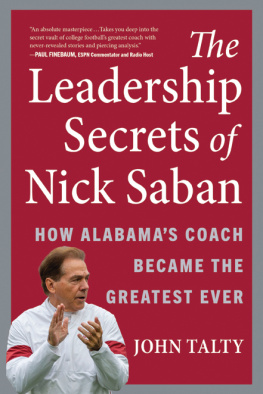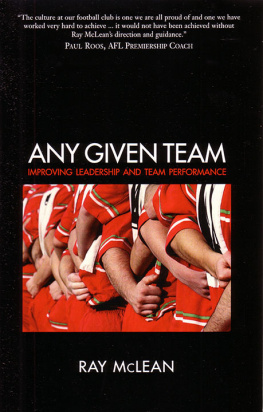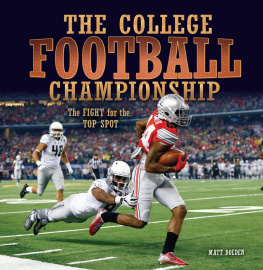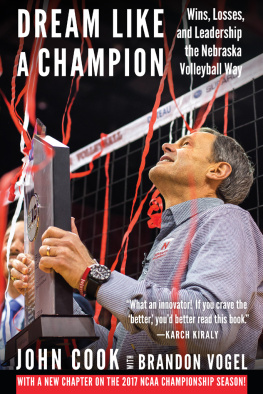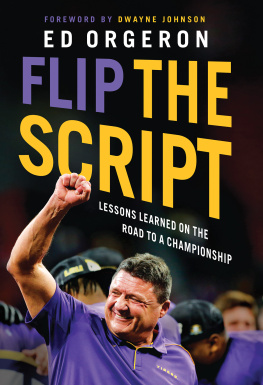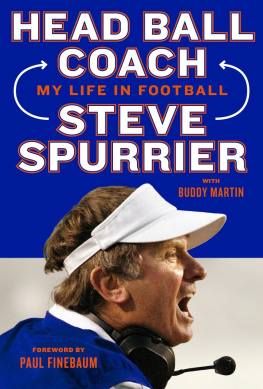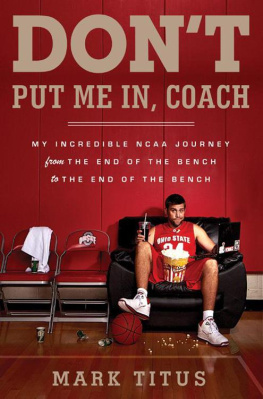Copyright 2015 by Urban and Shelly Meyer Family Foundation, Inc. o/b/o Urban Meyer
Penguin supports copyright. Copyright fuels creativity, encourages diverse voices, promotes free speech, and creates a vibrant culture. Thank you for buying an authorized edition of this book and for complying with copyright laws by not reproducing, scanning, or distributing any part of it in any form without permission. You are supporting writers and allowing Penguin to continue to publish books for every reader.
Photograph credits appear .
Diagrams by Focus 3. Used by permission.
All of the authors proceeds from the book will go to the Urban and Shelley Meyer Family Foundation.
To my amazing wife of twenty-six years, Shelley, and to our three incredible children, Nicki, Gigi, and Nate.
PROLOGUE: LEADING FROM THE HEART
T he book you are holding contains my thoughts and reflections on life and leadership. It is a compendium of what Ive learned in more than a quarter-century of coaching, a real-life leadership manual that offers insights and information into what we did in the 2014 season that culminated in winning the first-ever College Football Playoff National Championship.
The defining characteristic of every championship team is leadership. Leadership isnt a difference maker, it is the difference maker. Talent will get you about seven or eight wins. Discipline pushes it to nine wins, maybe. But when you add leadership, thats when magic happens.
Ive come to learn that leadership is not automatically granted to you because of your position or your salary or the size of your office. Leadership is influence based on trust that you have earned. A leader is not someone who declares what he wants and then gets angry when he doesnt get it. A true leader is someone who is going someplace and taking people with him, a catalyst for elite performance who enables people to achieve things they wouldnt achieve on their own. A leader is someone who earns trust, sets a clear standard, and then equips and inspires people to meet that standard.
Ive learned that talent cannot replace leadership. There is a long line of teams full of talented players and coaches who fail to produce results equal to their talent. Leaders take teams beyond talent to a place they likely thought was unreachable. It doesnt happen by accident. It happens because coaches and players are willing to respond to the everyday challenge of leadership. Nothing can stop the team that harnesses the power of leadership. Nothing can help the team that doesnt.
Over the years, I have grown as a leader. Ive made mistakes, and Ive learned from those mistakes. Ive had great mentors in men such as Earle Bruce, Lou Holtz, Sonny Lubick, and Bob Davie, and the lessons Ive learned from them I carry with me to this day. To me, its all about getting better. I am a long, long way from perfect, but I will put my passion for self-improvement next to anybodys. Maybe the only thing that rivals that in my makeup is the distaste I have for losing.
It has been that way since I was a kid in northeast Ohio, where one of my early lessons was that eight miles is a very long way to run. Its longer still if you are wearing a full baseball uniform and youve completely let your team down, losing a ball game because your bat never left your shoulder. I had to run. I had to do something. Id just stood there with the game on the line, star shortstop turned statue, as useless as a freighter stuck on the shoals of nearby Lake Erie. This was my senior year at St. John High School in my hometown of Ashtabula. It was early May 1982, a beautiful spring day until the end of it. I was about to get drafted by the Atlanta Braves, sign for a whopping $13,000 bonus, and go off to play a couple of forgettable years of professional baseball, but for the moment I was still a St. John Herald, with the tying and winning runs on base in a one-run game against our archrival, Harbor High School.
I love rivalry games. I loved them then and might love them even more now. No regular-season game on the Ohio State football schedule is bigger than when we play That Team Up North (it begins with M, but Woody Hayes taught us never to say the name around Columbus). The Harbor pitcher was a kid named John Light. He was good. He threw hard and had a great knuckleball. There were two outs in the bottom of the seventh inning. It was all on me, just the way I liked it. I got behind in the count and on a 22 pitch I knew that John Light was coming with a knuckleball or curve. Hed never come right at me, not in this spot. Except this time he did, a fastball down the middle, belt high, over the heart of the plate. It might as well have had a little sign on it that said CRUSH ME . No kidding. It was that fast. But I never budged. I just froze. The ump rang me up, and the pitch was so perfect I couldnt even turn around and say, Are you kidding me?
The ump wouldve told me to shut up and try swinging next time.
Some people had the idea that my father, Bud Meyer, a tough guy who was old school even by old school standards, ordered me to run home as punishment for coming up small. My father was not beyond doing that; one time when I was in third grade and getting into some mischief in Mrs. Stofkos class, she asked my dad how he wanted her to handle it.
Paddle him. Use a ruler. Punish him any way you want, my father said.
Mrs. Stofko said she couldnt do that without a parents written permission. So my father immediately signed a note, giving her permission. Mrs. Stofko kept the note in the drawer. It was amazing how fast my behavior improved.
Another time, my little sister, Erika, was getting bullied at school. I think she was in first grade, and this kid wouldnt leave her alone. My father told me I needed to take care of the situationto protect the family at all costs. The next day, I saw the kid at school, and, as directed by my father, I punched him in the face. I was in third grade. It was the first punch Id ever thrown. I got sent to the principals office, but I was a hero to my father. He took us out to eat at a place called the Swallows, on the corner of West and Prospect, an old brick place with a checkerboard tile floor, right behind the movie theater. You sit at the head of the table, my father told me. Youre a man now. Family is everything.
The run home had nothing to do with my father, though. It had completely to do with how much I hate to lose and how upset I was that I had let the team down. The concept of team, of committed, hardworking athletes bonding together for a greater purpose, has always been sacred to me. You are going to read a lot in this book about team and about ideas such as small-unit cohesion, 10-80-10, the R Factor, and the Performance Pathway. Youre going to read about how to build a winning culture in your organization and how to get your people to buy in. All of it is driven by a mission to lead people to achieve exceptional things. It takes an enormous amount of work, but the payoff is worth it because theres no better feeling in sports than seeing a group of young men give selflessly and work tirelessly to make the team the priority. Remarkable things happen when that occurs. Championships happen.

